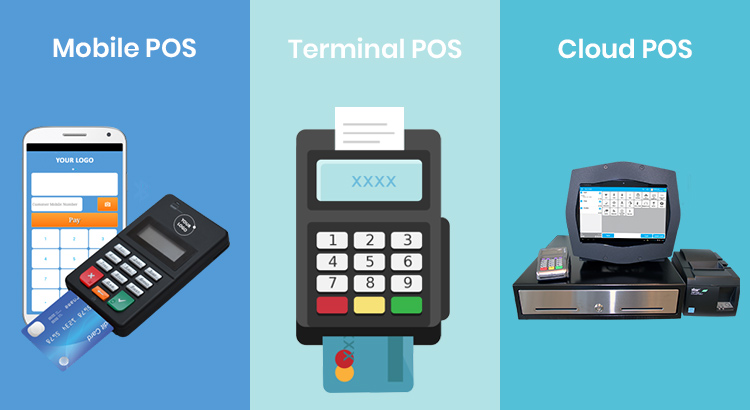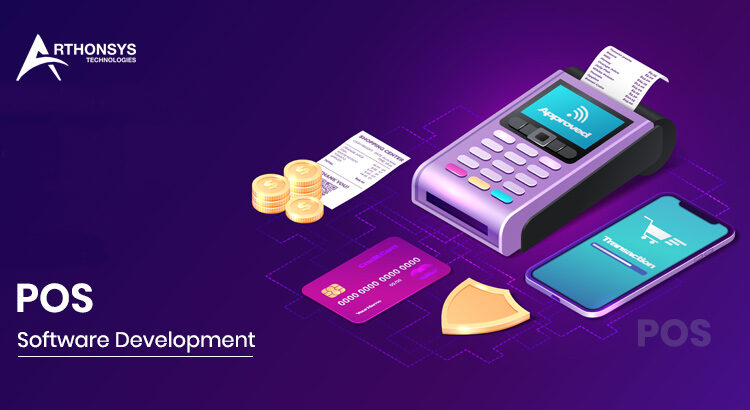There was a time when long queues in front of cash registers can be seen – but not anymore. Since brick and mortar retailers need to adapt fast and efficient systems to manage their sales. On the top, the whirlwind of the eCommerce market has pushed retailers to invest in Point of Sale Software Development.
The global POS software development market was recorded USD 8.2 billion in 2019, and it is projected to expand at a CAGR of 10.1% in the coming years. The need for cashless transactions and inventory management has been surged due to the increased online retail conduct in the last few years and forced businesses to improve sales strategies using analytical techniques.
What is POS Software?
POS is abbreviated for “Point of Sale.” It is a system that used to manage sales aspects at eCommerce, brick and mortar, and other retail establishments. POS system development has eased the process of transferring sales data to accounts, inventory, and similar relevant heads. With the help of POS software, all the retail activities like billing, returns, promotions, and others can be managed through a single portal.
At Arthonsys, we integrate our Point to Sales software development services with other systems such as eCommerce platforms, ERP software, and warehouse management apps for a better outcome. Thus, one full-featured POS software can handle multiple aspects of a business, including sales monitoring, analytics, inventory tracking, customer data management and much more.
Types of POS System Development
POS software is available in numerous different types. As per your organizational needs, you can pick the POS systems based on scale and operation. From small size online to enterprise-level physical POS system, you have an array of options. However, if you want to design custom POS software, you can get under the following three categories –

Mobile POS
Mobile POS or mPOS is a system based on mobile devices such as smartphones, tablets, etc. Like a credit card reader, the external hardware devices can be attached to mobile devices for a quick and portable solution. mPOS systems are lite versions to handle payment processes, inventory, sales monitoring, and much more.
They are a suitable POS software development solution for small businesses. Due to mPOS enormous benefits, the number of mPOS users is expected to cross 1800.4m by 2024.
Terminal POS
It is a software/hardware system that brings addon peripherals like barcode scanner, receipt printers, credit card readers, etc. These systems come with exceptional capabilities such as customer loyalty programs, reporting, management, and so on.
Thus, the POS software development company needs to invest extra time to develop terminal POS solutions. It is the perfect POS system for cash-based services like restaurants, boutiques, salons, gyms, etc.
Cloud POS
POS software developer has understood the need for lite software; thus, the web-based cloud POS system is developed. This system can easily integrate with your existing hardware such as laptops, printer, mobile, etc. With the cloud POS, you can experience all the terminal POS functionality – the only difference is that software isn’t installed on your server; it is available on the cloud system managed by a POS vendor.
The cloud POS systems are cheaper and secure than terminal POS. With the advancement in AR/VR app development, you can expect some highly robust POS solutions soon.
POS Software Key Features
If you have consulted a POS software development company to design a customized sales solution for you, make sure to include the following features in the software –
- Billing and Ordering – The basic function of POS software is to raise bills and orders. So, your software must have the capability to scan items and capture different payment methods. It should have the ability to generate an order invoice and share it with the end customers.
- Sales Monitoring and Reporting – Your POS software should be able to produce effective sales reports taking daily, weekly, or even yearly data. With this feature, you can understand the seasonal sales trends and create your sales strategy accordingly.
- Inventory Management – POS system must provide a 360-degree inventory view, including inventory history, inbound and outbound inventory, stock adjustments, and reasons behind stock changes.
- Accept Refunds and Returns – The software needs to accept refunds and cross channel returns from any store. The system should facilitate the development of multiple returns on single sales at different periods. It has to be potential enough to capture the reason behind returns and the person responsible for it.
- Customer Relationship Management – It is the responsibility of software to retain your customers based on their purchase history. The software should empower you to provide a personalized experience to your customers. Nowadays, eCommerce businesses are using omnichannel retail solutions to boost their business. Thus, it is essential for POS software to provide assistance in customer relationship management.
- Employee Management – Similar to customer management, a POS system can be used for employee management too. The POS employee module can help with managing your staffing levels, performance, and hourly rates.
Benefits of POS Software Development
One POS software can accelerate your business growth with numerous manners such as –
- Business Overview – POS software can provide a complete overview of your business by keeping a record of all the cash flow activities. These tools can maintain the financial, inventory, and sales status of your business.
- Product Categories Analysis – With the help of advanced reports, you can clearly understand which product category is most profitable for your business. When you know which product category isn’t performing well, you can change the sales strategy to boost its demand.
- Time Efficiency – You can save your sales clerk’s time to a great extent when cash flow and inventory management is handled by one software. POS systems can free up your lots of time that can be dedicated to other vital operations.
- Reduce Errors – Prices are automatically updated in the entire system, which reduces the chance of errors. Therefore, the price structure can be thoroughly maintained without any manual errors.
- Promotional Programs – When all your customers’ information is stored in one system, you can easily generate personalized promotional programs targeting your customers. This system will allow you to see which product is most purchased by a customer so that you create promotional programs accordingly.
How Much Does POS Software Development Cost?
To be honest, Point of Sale software development cost primarily depends upon the type and scale of business. It also revolves around your requirements and features that you want to embed into your POS system. However, the basic cost of POS software development starts at $5000. The cost can go up anywhere based on your requirements. To get the exact price quote, you should consult a POS software development company.
It is ideal for better results to get custom POS software that can fully meet your business requirements. If you want to create a custom POS system, you can contact the Arthonsys POS software developer team today and boost your sales!



